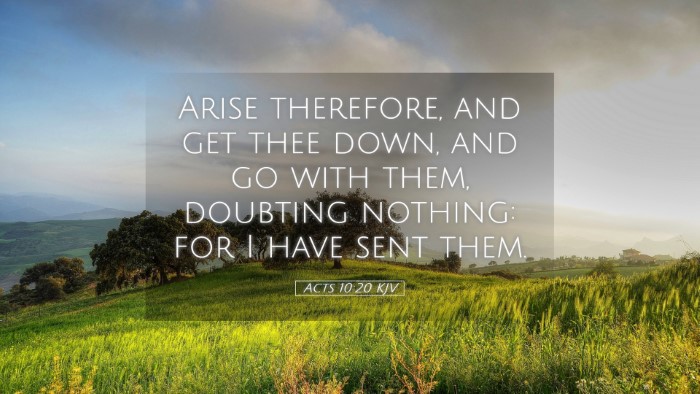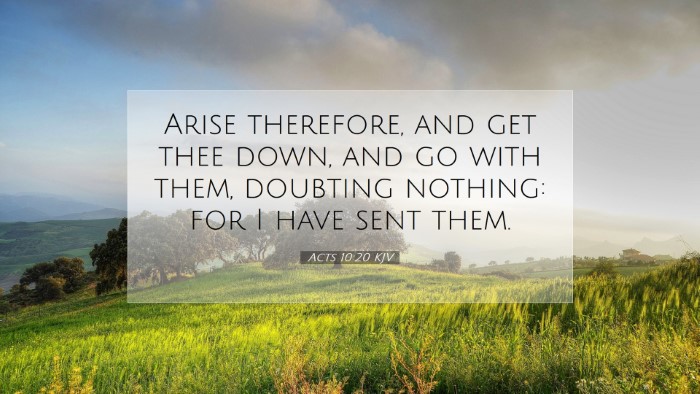Commentary on Acts 10:20
“But arise, and go down, and go with them, doubting nothing: for I have sent them.”
Introduction
The verse Acts 10:20 captures a pivotal moment in the early Church’s understanding of the gospel’s reach beyond the Jewish community to the Gentiles. In this commentary, we explore the various insights from renowned scholars including Matthew Henry, Albert Barnes, and Adam Clarke, focusing on the theological implications, historical context, and practical applications of this significant scripture.
Theological Implications
This command from God speaks volumes about His intention for the salvation of all humanity, revealing a fundamental aspect of divine grace. It showcases the expansion of the early Church's mission, which was initially thought to be limited to the Jews.
Divine Initiative
Henry notes that God often sends His messengers to prepare hearts for the reception of the gospel. The directive to Peter signifies that God is orchestrating events to draw Gentiles to Himself. This affirms that God's plans are not constrained by human prejudices or expectations.
Call to Action
Barnes emphasizes that Peter is instructed to act without hesitation—“doubting nothing.” This prompts reflection on the nature of obedience in the Christian life. Believers are called to respond promptly to God’s direction, even when it challenges societal norms and personal biases.
Faith Over Doubt
Clarke highlights the spiritual significance of "doubting nothing." This phrase challenges Christians to trust in divine guidance and to overcome their uncertainties. Faith must transcend fear in the face of God’s leading, especially in moments where the call may seem unconventional.
Contextual Analysis
To fully appreciate Acts 10:20, one must consider the unfolding narrative surrounding Peter's vision and the cultural tensions of the time. The early Church was primarily Jewish, and the inclusion of Gentiles was not widely accepted.
Historical Background
Henry provides a background that situates this event within the broader context of God’s redemptive plan. The visit from Cornelius, a Roman centurion, symbolizes a breakthrough in God's outreach and sets a precedent for future apostolic missions.
Peter's Transformation
Barnes reflects on Peter’s personal transformation. His journey from exclusivity to embracing Gentile believers illustrates the profound changes required within the Church. This moment marks the transition of Peter's ministry and denotes the unfolding of God’s inclusive plan for salvation.
Practical Applications for the Church Today
Acts 10:20 provides rich applications for modern believers and church leaders. The command to arise and go emphasizes proactive faith, especially regarding outreach and mission.
Overcoming Barriers
Henry would argue that the Church today is called to dismantle barriers—be they racial, cultural, or theological—that inhibit the spread of the gospel. Peter's experience exemplifies the necessity of embracing diversity within the body of Christ.
Missionary Zeal
Barnes urges the modern Church to maintain a vigorous missionary zeal, inspired by the Holy Spirit’s prompting. The call to “go with them” underlines the importance of teamwork in ministry and highlights the need to support one another in the mission field.
Encouragement to Trust God
Clarke suggests that, like Peter, Christians should be encouraged to trust in God’s sovereignty and wisdom. When faced with daunting tasks, believers can take comfort in the assurance that God equips those He calls, supporting them in every endeavor.
Conclusion
Acts 10:20 serves as a critical reminder of God’s relentless pursuit to include all people in His salvific plan. Through the combined insights of Matthew Henry, Albert Barnes, and Adam Clarke, we see the multiplicity of implications embedded in this verse. It calls for faithful obedience, challenges personal biases, and encourages the Church to embrace its diverse mission field. As we reflect on this scripture, may we, like Peter, be willing to arise, go, and respond to God’s leading, unencumbered by doubt.


